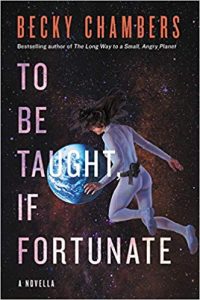 Cruel Winter with You (Under the Mistletoe Collection, #1) by Ali Hazelwood
Cruel Winter with You (Under the Mistletoe Collection, #1) by Ali Hazelwood Narrator: Vivienne LaRue
Format: audiobook, ebook
Source: purchased from Amazon, purchased from Audible
Formats available: ebook, audio
Genres: contemporary romance, holiday romance, short stories
Series: Under the Mistletoe #1
Pages: 73
Length: 2 hours
Published by Amazon Original Stories on November 12, 2024
Purchasing Info: Author's Website, Publisher's Website, Amazon
Goodreads
For two former childhood friends, a blustery winter storm stirs some frosty—and scorching—memories in a delightful short story by #1 New York Times bestselling author Ali Hazelwood.
All newly minted pediatrician Jamie Malek wants is to borrow a roasting pan for Christmas dinner. Unfortunately, that requires her to interact with Marc—her best friend’s troublemaking brother, who’s now a tech billionaire. He’s the one who got away. She’s the one who broke his heart. Outside, a howling blizzard. Inside, a crackling fire. Suddenly, being snowbound with the man she never expected to see again might not be such a bad way to spend a winter’s night.
Ali Hazelwood’s Cruel Winter with You is part of Under the Mistletoe, a stirring collection of December romances that thrill and tingle all the way. They can be read or listened to in one swoony sitting.
My Review:
 I was stuck in traffic at the end of Only Santas in the Building and found myself listening to the teasers for ALL the rest of the stories in the Under the Mistletoe collection and, well, I got hooked. So here we are back with another not too big, not too small, just right little holiday romance to sweeten – and heat up – the season.
I was stuck in traffic at the end of Only Santas in the Building and found myself listening to the teasers for ALL the rest of the stories in the Under the Mistletoe collection and, well, I got hooked. So here we are back with another not too big, not too small, just right little holiday romance to sweeten – and heat up – the season.
This one is the longest entry in the collection, so it has just a bit more time and scope to get into the setup of the story and the backstory of the characters – and do they EVER have backstory. So this one gets just a bit deeper than the others – and it makes for a nice change of pace from the rest.
Jamie and Marc were not childhood sweethearts. Nor did they have a high school romance. Not that Marc didn’t want either of those things to happen. He was just very, very good at not letting Jamie know it.
Which was probably a good thing, as Jamie and his older sister Tabitha were childhood and high school besties. And even when this story takes place – ten whole years after Jamie and Tabitha’s high school graduation – Tabitha still hasn’t gotten past her childhood resentment of her parents’ bringing home their ‘Oops Baby’ just after her third birthday.
But Marc seems to have recognized that Jamie was his person the very first time she held him in her arms, when he was a newborn and she was all of two-and-a-half. In spite of decades of teasing and name-calling and everything that children can do to each other short of outright warfare, Jamie is still his person – a fact that Marc has built his entire life around even as he’s held it so close to his heart that Jamie doesn’t have a clue.
But on this one blustery cold winter night, stuck together at his parents’ otherwise empty house because her self-absorbed father thought nothing of sending her two miles down the road, on foot, in an impending northern Illinois blizzard, to retrieve a copper baking pan from his parents’ kitchen – all the secrets are laid bare.
And finally, at last, so are they.
 Escape Rating B: In a collection of mostly fluff, this story gets surprisingly deep. And sad. And just a bit heartbreaking. It’s told in a series of flashbacks, sandwiched between the events of the now, and those flashbacks are what give the story its depth. But not in the way one expects.
Escape Rating B: In a collection of mostly fluff, this story gets surprisingly deep. And sad. And just a bit heartbreaking. It’s told in a series of flashbacks, sandwiched between the events of the now, and those flashbacks are what give the story its depth. But not in the way one expects.
It’s never been quite the right time for Jamie and Marc. She’s not quite three years older – something that mattered a lot when they were children but doesn’t matter in their late 20s at all. When things have gotten hard between them – not like that – it’s been because Marc’s been keeping the secret of his true feelings for Jamie pretty much all of his life – and occasionally those feelings get impatient.
He’s always been ready, but Jamie hasn’t. Because she’s afraid, not of Marc, not of having Marc, but of losing him. And it’s in the past that we see why. And that’s where the heartbreaking bits come in, because it’s not about him. It’s about her dad. Not in any terrible way, but certainly in a terribly human way.
I have to admit that Marc’s behavior occasionally tip-toed up to the line into the song “Every Breath You Take” in that it seems like he’s always been watching Jamie, always looking at her and after her even if she doesn’t know it, always waiting for the right moment to tell her that he loves her, planning his whole, entire life around making that happen. It seems romantic – but it’s also just a bit squicky and could have easily gone VERY wrong.
 If it had it wouldn’t have fit in this collection at all. But since it didn’t, it did. And it does, in the end, work out. They are both finally in the right place at the right time with all their cards on the table.
If it had it wouldn’t have fit in this collection at all. But since it didn’t, it did. And it does, in the end, work out. They are both finally in the right place at the right time with all their cards on the table.
I’m still enjoying this collection, the audios have ALL been lovely including this story’s voicing by Vivienne LaRue, and it’s all still feeling “just right” for the season. I may finish them ALL before this holiday is done. After all, Hanukkah doesn’t end until January 2, 2025, so I have plenty of time to indulge my holiday spirit!

 Bayou Book Thief (Vintage Cookbook Mystery, #1) by
Bayou Book Thief (Vintage Cookbook Mystery, #1) by  Escape Rating B: Bayou Book Thief was simply a delicious starter for a cozy mystery series. There was plenty of atmosphere – well of course because New Orleans – along with tempting red herrings, a fascinating ‘home base’ filled with interesting and quirky characters AND a whole series of villains that were easy to hate.
Escape Rating B: Bayou Book Thief was simply a delicious starter for a cozy mystery series. There was plenty of atmosphere – well of course because New Orleans – along with tempting red herrings, a fascinating ‘home base’ filled with interesting and quirky characters AND a whole series of villains that were easy to hate. Little do they know that it’s not grand-mère’s once upon a time scandal that will cause the most problems. It’s not even Ricki’s much more recent scandals – the ones that she hoped she had left behind in LA. (That she had one serious scandal in her past is not atypical for the amateur detective in a cozy series. Two, however, struck this reader as a bit over-the-top, as both scandals were extremely juicy to the point where having one person be involved in both felt a bit like ‘overegging the pudding’. I’m curious to see the effects they’ll have on Ricki in future books in the series.)
Little do they know that it’s not grand-mère’s once upon a time scandal that will cause the most problems. It’s not even Ricki’s much more recent scandals – the ones that she hoped she had left behind in LA. (That she had one serious scandal in her past is not atypical for the amateur detective in a cozy series. Two, however, struck this reader as a bit over-the-top, as both scandals were extremely juicy to the point where having one person be involved in both felt a bit like ‘overegging the pudding’. I’m curious to see the effects they’ll have on Ricki in future books in the series.) Mechanize My Hands to War by
Mechanize My Hands to War by  Escape Rating A: The story, the outer layer of it at least, is deceptively simple. And then things get really complicated, both in the story itself and in what’s hiding underneath it. Whenever I stop to think about it for even a minute, more ideas pop to the surface and swim underneath.
Escape Rating A: The story, the outer layer of it at least, is deceptively simple. And then things get really complicated, both in the story itself and in what’s hiding underneath it. Whenever I stop to think about it for even a minute, more ideas pop to the surface and swim underneath.

 Current Giveaways:
Current Giveaways: Blog Recap:
Blog Recap: Coming This Week:
Coming This Week:







 The Hero She Deserves (Unbroken Heroes) by
The Hero She Deserves (Unbroken Heroes) by  And she absolutely does. After all the fake heroes she’s played opposite in all of her movies, Oscar-winning actress Hollis Stanton deserves a real hero of her own just when she needs him the most.
And she absolutely does. After all the fake heroes she’s played opposite in all of her movies, Oscar-winning actress Hollis Stanton deserves a real hero of her own just when she needs him the most. Escape Rating B: Just like the story reminded me of “Holding Out for a Hero”, the hero in the story reminds Hollis Stanton of the hero of the
Escape Rating B: Just like the story reminded me of “Holding Out for a Hero”, the hero in the story reminds Hollis Stanton of the hero of the 
 Orbital by
Orbital by 
 So if you’re looking at this as an example of SF, it’s really not. If you’re interested in literary SF there are better examples. I’m particularly thinking of Ray Nayler’s
So if you’re looking at this as an example of SF, it’s really not. If you’re interested in literary SF there are better examples. I’m particularly thinking of Ray Nayler’s  A Snake in the Barley (An Owen Archer mystery Book 15) by
A Snake in the Barley (An Owen Archer mystery Book 15) by  The previous entry in this marvelous long-running series,
The previous entry in this marvelous long-running series,  Escape Rating A-: I adore this series, and have since I read the very first book,
Escape Rating A-: I adore this series, and have since I read the very first book,  How to Steal a Galaxy (Chaotic Orbits #2) by
How to Steal a Galaxy (Chaotic Orbits #2) by  In this arresting follow-up to the first book in the
In this arresting follow-up to the first book in the  When she rips it off at the end it’s an ‘aha!’ moment for the reader and an utter shock to White – and that’s when we all get the shape of things to come – or at least we think we do. Ada may have fooled us all again and we won’t learn in exactly what way until the final book in the trilogy,
When she rips it off at the end it’s an ‘aha!’ moment for the reader and an utter shock to White – and that’s when we all get the shape of things to come – or at least we think we do. Ada may have fooled us all again and we won’t learn in exactly what way until the final book in the trilogy, 

 🔔 🎁 🕯️ 🎅 👼 🤶 ❄️ ☃️ 👪 ⛄ 🌟 🎄 🦌 🍪 🥛 🎁 🎀
🔔 🎁 🕯️ 🎅 👼 🤶 ❄️ ☃️ 👪 ⛄ 🌟 🎄 🦌 🍪 🥛 🎁 🎀